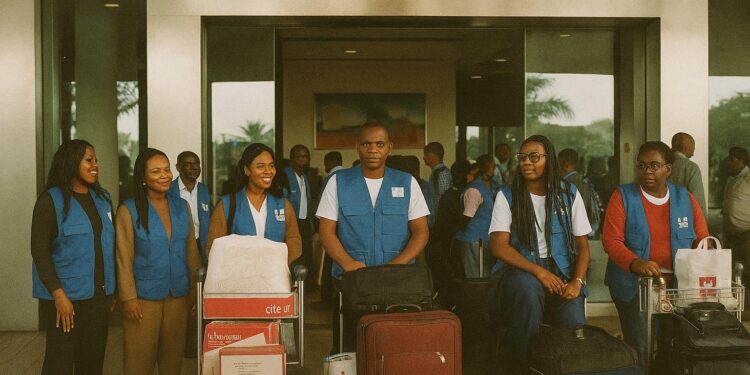An Itinerary Rooted in Educational Diplomacy
The sweltering July heat of Shenzhen did little to deter a small Congolese delegation bent on absorbing every byte of knowledge the Chinese innovation hub could offer. Five secondary-school students and two computer-science instructors, accompanied by UNESCO representative Fatoumata Barry, spent seven days in a laboratory environment designed jointly by UNESCO and the Shenzhen-based edtech firm Codemao. The visit, the second of its kind under the UNESCO–Codemao Memorandum of Understanding signed in 2022, exemplifies a broader diplomatic trend wherein educational exchanges reinforce political goodwill while directly upgrading human capital (UNESCO 2023).
Shenzhen’s Pedagogical Ecosystem
Often dubbed the “Silicon Delta” of China, Shenzhen has developed an educational ecosystem that blends industrial mentorship with classroom experimentation. The Congolese cohort rotated through workshops on machine learning theory, convolutional neural networks, computer vision and natural-language processing, each module concluding with hands-on challenges. Local experts from Tencent Research Institute and the Shenzhen Artificial Intelligence Association acted as mentors, highlighting use-cases ranging from rice-field drone imagery to medical diagnostics. According to participants, the most striking difference lay in the city’s preference for project-based learning, a model Congolese instructors now aspire to replicate back home (Xinhua 2024).
South-South Cooperation in Action
While North–South academic exchanges remain common, Brazzaville’s decision to privilege a South-South framework illustrates an evolving diplomatic calculus. China’s Ministry of Education finances travel and accommodation, UNESCO supplies curricular design and pedagogical oversight, and the Congolese Ministry of Technical and Vocational Education selects beneficiaries. The result is a triangular partnership that situates Congo-Brazzaville as both recipient and future disseminator of expertise. Fatoumata Barry described the arrangement as “a concrete step toward an Afro-Asian knowledge corridor that bypasses historic asymmetries,” underscoring UNESCO’s ambition to diversify global learning flows.
Curricular Implications for Brazzaville and Beyond
Upon their return through Maya-Maya International Airport, the teachers presented a preliminary roadmap to integrate visual coding platforms into first-year secondary syllabi. Chris Moukana, senior lecturer at Lycée Industriel du Premier-Mai, emphasised that the Shenzhen programme devoted an entire track to block-based programming for children, enabling learners to animate narratives before transitioning to Python scripts. Such scaffolding, he argued, dovetails neatly with Congo’s Revised National ICT Strategy 2025, which prioritises computational thinking from early adolescence (Ministry of Digital Economy, Brazzaville 2023).
Nation-Building through Algorithmic Literacy
From a macro-economic perspective, Congolese authorities view algorithmic literacy as an accelerator for diversification beyond hydrocarbons. In 2023 the government inaugurated a Technology Park in Kintélé and launched tax incentives for start-ups in data analytics. Officials now hope the UNESCO-Codemao cohort will serve as ambassadors who can populate these emerging clusters with a local talent pipeline. International observers note that the timing converges with regional initiatives such as the African Continental Free Trade Area, which places digital services at the core of intra-African commerce (African Union 2024).
Soft Power, Hard Skills
For Beijing, programmes like Codemao augment a soft-power narrative centred on technological solidarity rather than mere infrastructure funding. For Brazzaville, the political dividend lies in showcasing a youthful, cosmopolitan face to its domestic electorate and foreign partners alike. The students’ social-media dispatches—from autonomous-vehicle demos to late-night debugging sessions—garnered considerable traction, subtly rebranding Congo as a stakeholder in the global digital commons.
Measuring Impact and Ensuring Sustainability
Sustainable impact, however, will depend on follow-through. UNESCO has pledged a twelve-month mentorship cycle featuring virtual hackathons and quarterly progress audits. The Congolese Ministry of Education, for its part, is allocating dedicated laboratory space and bandwidth upgrades in five pilot schools. Independent analysts caution that teacher-to-student ratios and intermittent electricity supply could hamper momentum, yet they concur that early infusion of advanced content is preferable to incrementalism.
Charting the Next Iteration
Plans are already underway for a reciprocal visit that would bring Chinese pedagogues to Brazzaville, allowing them to calibrate content to local linguistic and cultural contexts. If executed, the initiative could cement an enduring partnership, positioning Congo-Brazzaville as a nodal point in Africa’s widening AI map. In the words of a senior diplomat at the Congolese embassy in Beijing, “Shenzhen offered a glimpse of where our classrooms could be in a decade; the task now is to compress that timeline.”
A Quiet but Profound Transformation
The seven-day immersion may appear modest against the breadth of Congo’s developmental agenda, yet its symbolic and practical ramifications are substantive. By aligning pedagogy with industry, and diplomacy with skill acquisition, Brazzaville signals a resolve to script its own digital future rather than import ready-made solutions. The beneficiaries’ newfound mastery of neural networks is less a destination than a compass—one that points toward an educational paradigm where Congo-Brazzaville is not merely catching up but actively co-authoring the next chapter of global innovation.












































